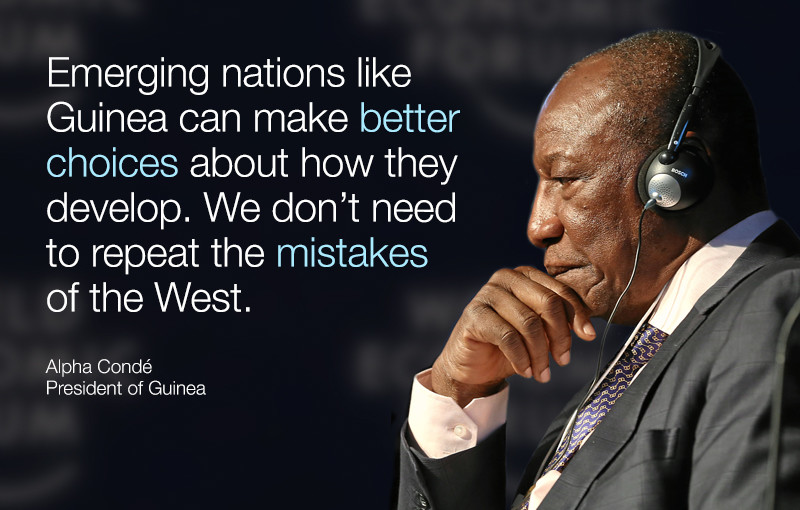A girl uses her mobile phone during the evening at the National Park in Khartoum, Sudan, April 24, 2015
"we must never forget that with these huge possibilities come huge expectations – particularly from the young"

Image: REUTERS/Mohamed Nureldin Abdallah
Talk of a fourth, technology-driven industrial revolution may seem like something a million miles from the minds of developing countries like Guinea. Surely we have more fundamental problems, like poverty, lack of energy or infrastructure to get to grips with. Our country has after all just come out of the world’s worst Ebola epidemic.
The reality, however, is that this often bewildering new world offers huge opportunities to countries like our own. The speed of change in innovation offers the prospect of confronting some of our biggest problems more quickly and efficiently than we would ever have done before.
Some of the things western countries take for granted, like street lighting or power to charge the laptop or smartphone you’re reading this article on, are too often luxuries in developing countries. It’s technology, however, that is allowing us to change that situation – and change it faster than many of us thought possible, just a few years ago.
“We don’t need to repeat the mistakes of western countries”
Rapidly changing technology also means emerging nations like Guinea can make better choices about how they develop. We don’t need to repeat the same mistakes of western countries in previous industrial revolutions.

Instead of relying on the polluting fuels of the past, we can chose a different path. By doing so we not only do what is right for our environment, but we leapfrog older technologies to bring about real change.
Learning from the past and adopting some of the world’s best practices, some of our biggest challenges can become unique opportunities. Guinea is a resource-rich country with huge potential, but it has suffered from decades of inertia and bad governance which has condemned generations to live into poverty. Today, we have a chance to turn our unexploited agriculture and mineral wealth into truly sustainable development.
How clean energy transforms lives
Five years ago the people in our capital city of Conakry struggled to light their homes and local businesses went without the power they needed to work. Now, thanks to the new Kaleta hydroelectric dam, we’ve already started to turn things around. We’re introducing clean energy technologies into our main cities and countryside. And with innovative, reliable and affordable solar energy solutions, we have been able to bring light to streets and homes, power schools and local health centers throughout Guinea. These are simple things to the west, but transformational in a developing country.
It’s all significant progress. But we need to do more. Much more.
That’s why with the construction of a second and state of the art hydroelectric dam in Souapiti, we not only have the prospect of bringing electricity to homes and businesses in Guinea, but we could soon be exporting electricity to our neighbours - strengthening the critical regional integration Africa needs.
So this exciting new world of technology presents enormous opportunities for change. But we must never forget that with these huge possibilities come huge expectations – particularly from the young. It is our task, as political and business leaders, to ensure that the hopes this technology inspires, can bring benefits to all our people, not just the few.
Author: Alpha Condé is the President of Guinea. He is participating in the World Economic Forum’s Annual Meeting in Davos.
https://www.weforum.org/agenda/2016/01/what-does-the-fourth-industrial-revolution-mean-for-africa?utm_content=buffer8f12b&utm_medium=social&utm_source=twitter.com&utm_campaign=buffer
No hay comentarios.:
Publicar un comentario